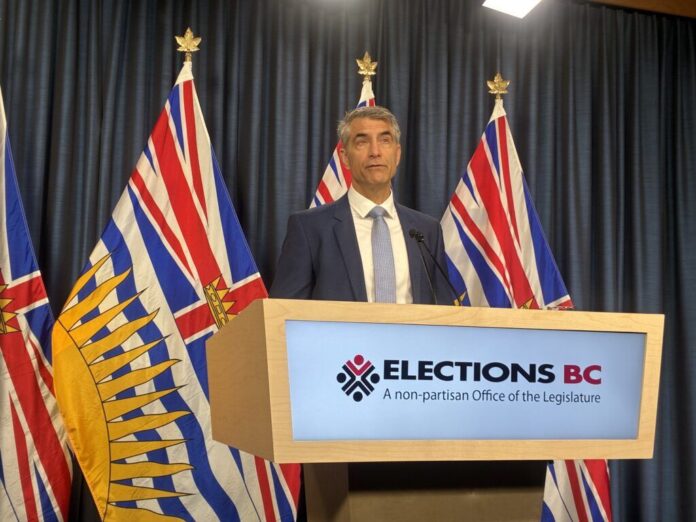B.C.’s chief electoral officer finds October’s provincial elections were “free and fair,” but says the agency had to push back against frequent misinformation related to the election.
Elections B.C. released the first part of Anton Boegman’s report on the October 2024 election, identifying a number of “false narratives” about the election that circulated online and elsewhere.
Boegman says most of the social media posts identified as containing misinformation or disinformation came from outside of B.C., including from Alberta and Ontario. He says the agency didn’t find any co-ordinated efforts to influence the election from outside of Canada. The report also says Elections B.C. received a number of questions leading up to the election about the use of technology, “many based on incorrect information originating in the United States.”
The report says October’s election saw the most votes ever cast in a B.C. provincial election, with more than 58 per cent of registered voters casting a ballot. It was also the first provincial election to use new technology, which was first tested in by-elections in 2022. It allowed elections officials to use networked laptops to check people in, replacing paper voter rolls. The report finds the technology was secure, reduced line-ups at voting places and reduced the number of rejected ballots.
B.C. Conservative leader John Rustad voiced concerns about the election process that include what Elections Canada has identified as “false narratives.” Rustad told reporters at the legislature on Tuesday he has concerns that the results may have been impacted by non-citizens voting and people casting multiple votes. Rustad also questioned the security of the assisted telephone voting process.
“Elections B.C., quite frankly, is failing in the work that they’re doing in British Columbia,” Rustad told reporters at the legislature Tuesday.
“The vast majority of people in the province are honest and good people. The problem is there’s too much room for potential manipulation and errors.”
Rustad said he accepts the results of the October election, but says he also questions the results in certain ridings, without specifying which ridings he was referring to. He reiterated his call for independent investigation into October’s election and the Election Act itself.
Rustad suggested B.C. identification cards be changed to include a letter “C” to indicate that the holder is a Canadian citizen. The Election Act doesn’t require voters to provide proof of citizenship to register or vote. But Boegman worries that may create additional barriers for voters. The report notes that everyone who shows up to vote must declare they meet the eligibility requirements, including citizenship.
Boegman says as the head of a non-partisan agency he won’t comment on politics, but says he encourages all legislators to read the report to verify their facts, and raise any concerns they have with Elections B.C.
Boegman says Elections B.C. takes a number of measures to make sure the voters list is as accurate as possible, to prevent the possibility of people being listed more than once, and ensure people who have died are removed from the list.
“Can the list be better? Of course, and we are always looking at ways to improve the list,” he says.
He also emphasized the security of the telephone assisted voting system for voters with disabilities that prevent them from voting in person. Boegman says people go through a number of steps to register and verify their identity with election officials. The report says assisted telephone voting accounted for 0.2 per cent of votes cast in October’s election.
Some of the other “false narratives” identified by Elections B.C. are concerns that ballot boxes weren’t secure or that ballots weren’t properly counted. Boegman acknowledges one ballot box in Prince George-Mackenzie wasn’t counted on election night. Elections BC says it applied for the judicial recount for the ballot box containing 861 votes, but that it didn’t affect the election results.
“Elections are messy,” says Boegman. “While all election officials are given training, at times they do make mistakes.” He stresses that all mistakes identified during the election were corrected, and that Elections B.C. is committed to transparency.
Boegman says while trust in the democratic process remains high, he acknowledges Elections B.C. could be doing more to engage with the public to build trust and counter misinformation.
A baseline report released by the Media Ecosystem Observatory just ahead of the election found that British Columbians were overall feeling confident the election would be run fairly and had higher levels of trust in the security of voting machines as compared to other Canadians.
The second half of Boegman’s report detailing how much the election cost is due this summer.






